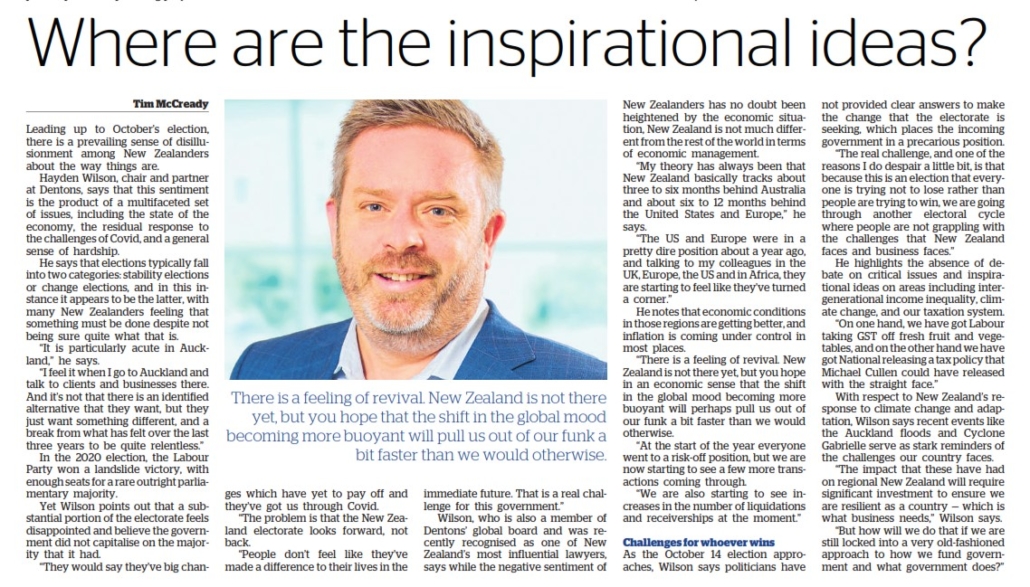Mood of the Boardroom: Where are the inspirational ideas? (NZ Herald)
Leading up to October’s election, there is a prevailing sense of disillusionment among New Zealanders about the way things are.
Hayden Wilson, chair and partner at Dentons, says that this sentiment is the product of a multifaceted set of issues, including the state of the economy, the residual response to the challenges of Covid, and a general sense of hardship.
He says that elections typically fall into two categories: stability elections or change elections, and in this instance it appears to be the latter, with many New Zealanders feeling that something must be done despite not being sure quite what that is.
“It is particularly acute in Auckland,” he says.
“I feel it when I go to Auckland and talk to clients and businesses there. And it’s not that there is an identified alternative that they want, but they just want something different, and a break from what has felt over the last three years to be quite relentless.”
In the 2020 election, the Labour Party won a landslide victory, with enough seats for a rare outright parliamentary majority.
Yet Wilson points out that a substantial portion of the electorate feels disappointed and believe the government did not capitalise on the majority that it had.
“They would say they’ve big changes which have yet to pay off and they’ve got us through Covid.
“The problem is that the New Zealand electorate looks forward, not back.
“People don’t feel like they’ve made a difference to their lives in the immediate future. That is a real challenge for this government.”
Wilson, who is also a member of Dentons’ global board and was recently recognised as one of New Zealand’s most influential lawyers, says while the negative sentiment of New Zealanders has no doubt been heightened by the economic situation, New Zealand is not much different from the rest of the world in terms of economic management.
“My theory has always been that New Zealand basically tracks about three to six months behind Australia and about six to 12 months behind the United States and Europe,” he says.
“The US and Europe were in a pretty dire position about a year ago, and talking to my colleagues in the UK, Europe, the US and in Africa, they are starting to feel like they’ve turned a corner.”
He notes that economic conditions in those regions are getting better, and inflation is coming under control in most places.
“There is a feeling of revival. New Zealand is not there yet, but you hope in an economic sense that the shift in the global mood becoming more buoyant will perhaps pull us out of our funk a bit faster than we would otherwise.
“At the start of the year everyone went to a risk-off position, but we are now starting to see a few more transactions coming through.
“We are also starting to see increases in the number of liquidations and receiverships at the moment.”
Challenges for whoever wins
As the October 14 election approaches, Wilson says politicians have not provided clear answers to make the change that the electorate is seeking, which places the incoming government in a precarious position.
“The real challenge, and one of the reasons I do despair a little bit, is that because this is an election that everyone is trying not to lose rather than people are trying to win, we are going through another electoral cycle where people are not grappling with the challenges that New Zealand faces and business faces.”
He highlights the absence of debate on critical issues and inspirational ideas on areas including intergenerational income inequality, climate change, and our taxation system.
“On one hand, we have got Labour taking GST off fresh fruit and vegetables, and on the other hand we have got National releasing a tax policy that Michael Cullen could have released with the straight face.”
With respect to New Zealand’s response to climate change and adaptation, Wilson says recent events like the Auckland floods and Cyclone Gabrielle serve as stark reminders of the challenges our country faces.
“The impact that these have had on regional New Zealand will require significant investment to ensure we are resilient as a country — which is what business needs,” Wilson says.
“But how will we do that if we are still locked into a very old-fashioned approach to how we fund government and what government does?”
